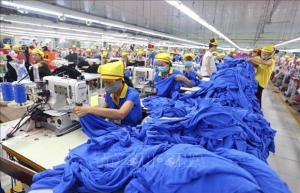More feasible solutions warranted for growth
 |
| Removing issues in production and business is a top priority for the nation’s leaders, photo Le Toan |
The Central Institute for Economic Management has suggested to the government that there should be new macroeconomic solutions for the economy to achieve its 6-6.5 per cent growth this year and beyond.
“There is a need to formulate an overall programme on boosting economic growth for the 2024-2025 period,” said the institute (CIEM).
Under the programme, the government will need to continue simplifying procedures, processes, and conditions to facilitate enterprises to have more favourable access to credits, especially those being small- and medium-sized enterprises (SMEs), those managed by women, and those being labour-intensive.
Currently SMEs are accounting for over 90 per cent of Vietnam’s total number of about 800,000 businesses. The majority of SMEs are cash-strapped and lack output markets.
The CIEM also proposed a rise in the cap of foreign investors’ stake in commercial banks from the existing 30 per cent cap.
When it comes to attracting foreign investment, it suggested that besides continued implementation of tasks already set towards 2030, the government is advised to formulate and enact more feasible solutions to boost technology transfer from foreign-invested enterprises based on a foundation that does not violate international commitments and practices and on investors’ consensus.
Additionally, the CIEM also recommended that changes be made in regulations to facilitate such enterprises to engage in pharmaceutical product distribution in the Vietnamese market. Currently, they are allowed to import but are banned from distributing these products in the country.
At a government meeting a fortnight ago, Prime Minister Pham Minh Chinh underlined the global challenges that can directly hurt the Vietnamese economy.
“Currently, issues in the Red Sea are complicated. Conflicts in Ukraine and Gaza have been prolonged with increasingly serious aftermaths. These have and will continue affecting the global supply chain, threatening food and energy security, while crude oil and food prices keep increasing, affecting global inflation,” PM Chinh stated.
Domestically, there is a high pressure on macroeconomic monitoring due to sharp fluctuations in crude oil prices, food prices, and exchange rates in the world market, he continued.
“Meanwhile, the production and business situation in some enterprises remains in difficulty, with one of the main reasons related to access to capital resources. Industrial production in some sectors and locations has recovered slowly. Some service sectors, especially catering and entertainment, have not recovered clearly.”
Regulatory hurdles
According to the General Statistics Office, just over 89,000 businesses halted operations last year – up 20.7 per cent on-year; 65,500 enterprises stopped operations and waited for dissolution procedures – up 28.9 per cent; and 14,400 enterprises completed such procedures.
In the first two months of this year, 49,300 businesses halted operations, up 27.1 per cent on-year. Some 10,000 enterprises stopped operations and waited for dissolution procedures, up 6.5 per cent on-year; and nearly 3,700 enterprises completed such procedures. On average, about 31,500 businesses were kicked out of the market each month.
Under a Q4 2023 survey by the General Statistics Office involving over 6,500 manufacturing and processing enterprises nationwide, the surveyed businesses reported that they are facing numerous difficulties both at home and in export markets.
Many hurdles have been cited, such as low domestic demand (58.2 per cent), domestic goods’ low competitiveness (49.8 per cent), weak international market demand (35.7 per cent), and general financial difficulties (32.1 per cent).
As for industrial output, only one-third of respondents said there had been a rise in such output in Q4 as compared to Q3. In Q1 2024, only 30 per cent of respondents reported an expected increase in production from Q4 of 2023.
In 2023, Vietnam’s on-year exports dipped in all key markets, including the US (11.6 per cent), South Korea (3.4 per cent), ASEAN (4.1 per cent), the EU (5.9 per cent), and Japan (3.2 per cent).
According to the European Chamber of Commerce’s Business Confidence Index released in January, valuable insights emerge regarding the regulatory challenges perceived by the business community in Vietnam. Just over half of all respondents identified “administrative burdens and bureaucratic inefficiencies” as one of the top three hurdles, while one-third of businesses highlighted “unclear and variably interpreted rules and regulations” as a major challenge.
On the solutions front, the survey highlights key areas for improvement to boost Vietnam’s attractiveness for foreign investment, with 54 per cent of respondents calling for “administrative and bureaucratic streamlining”, indicating that easing bureaucratic processes could significantly enhance the business environment.
Additionally, 45 per cent stressed the importance of “strengthening the legal system and regulatory environment”, while 30 per cent see “infrastructure development, including roads, ports, and bridges” as essential for investment attraction from abroad.
Wider assistance
PM Chinh has ordered that more substantive efforts be made to quicken administrative reforms and remove difficulties for production and business activities.
“One of the key tasks is to strongly boost industrial production with a focus laid on helping manufacturing and processing activities out of difficulties; strengthening the development of supporting industries; and accelerating the construction speed of large-scale projects,” he stressed.
“We pledged to create an open investment environment and complete the legal system for effective investment, in the spirit of harmonising interests and sharing risks between the state, people and businesses,” he stated.
In 2023, the total value of all policies used for supporting the public and enterprises amounted to $8.37 billion, including almost $7 billion worth of tax-related assistance.
Last year, the government cut, reduced, or simplified 340 business regulations; simplified 390 admin procedures; and decentralised over 150 procedures.
The Vietnamese government has asked the State Bank of Vietnam (SBV) to direct commercial banks to raise loans as a means of stimulating economic growth. However, according to the Vietnam Association of Small- and Medium -Sized Enterprises, many enterprises are facing challenges without seeking additional loans. As a result, banks are finding it difficult to increase their loan portfolios.
Paulo Medas, mission chief for Vietnam at the International Monetary Fund, told VIR that the demand for credit by businesses depends on their needs for working capital or investments. In 2023, businesses faced weaker external demand, and softer consumption growth, which can explain why businesses may be reluctant to take more debt even if interest rates fall.
“In such conditions, pushing too hard to increase credit may result in some loans being issued for too risky projects, which may generate problems down the road,” Medas said.
PM Chinh has also ordered the SBV to comprehensively review the credit granting results of the credit institution system for the economy in general and in each specific economic sector. He also asked for a review of credit granting results of each credit institution and commercial bank in order to have effective and feasible measures to manage credit growth and interest rates in 2024 according to the law.
| Although exports and production are expected to continue to recover, growth in consumption may lag as consumer confidence remains weak. The current surge in international logistics costs for merchandise trade associated with the Middle East conflict might negatively affect Vietnam’s exports, and subsequently the recovery of the economy. Continued interest rate differential between global and domestic interest rates might put pressure on the foreign exchange markets, requiring the SBV to maintain flexible management of the exchanges rate and market liquidity. Financial sector vulnerabilities, including a recent surge in non-performing loans (from 2.7 to 4.9 per cent by the end of 2023), call for continued vigilance.Source: World Bank |
 | PM urges further rate cuts, improved credit access to remove obstacles, promote growth Prime Minister Phạm Minh Chính chairs the meeting to implement monetary policy management tasks in 2024, which focuses on removing difficulties for production and business to promote growth and ensure macroeconomic stability. |
 | SMEs should improve capacity to lure venture capital: economists Vietnamese small- and medium-sized enterprises (SMEs) should better their management capacity and business strategies so as to draw capital from both domestic and foreign investment funds who are holding hundreds of billions of USD, economists have said. |
What the stars mean:
★ Poor ★ ★ Promising ★★★ Good ★★★★ Very good ★★★★★ Exceptional
Related Contents
Latest News
More News
- State corporations poised to drive 2026 growth (February 03, 2026 | 13:58)
- Why high-tech talent will define Vietnam’s growth (February 02, 2026 | 10:47)
- FMCG resilience amid varying storms (February 02, 2026 | 10:00)
- Customs reforms strengthen business confidence, support trade growth (February 01, 2026 | 08:20)
- Vietnam and US to launch sixth trade negotiation round (January 30, 2026 | 15:19)
- Digital publishing emerges as key growth driver in Vietnam (January 30, 2026 | 10:59)
- EVN signs key contract for Tri An hydropower expansion (January 30, 2026 | 10:57)
- Vietnam to lead trade growth in ASEAN (January 29, 2026 | 15:08)
- Carlsberg Vietnam delivers Lunar New Year support in central region (January 28, 2026 | 17:19)
- TikTok penalised $35,000 in Vietnam for consumer protection violations (January 28, 2026 | 17:15)

 Tag:
Tag:


















 Mobile Version
Mobile Version